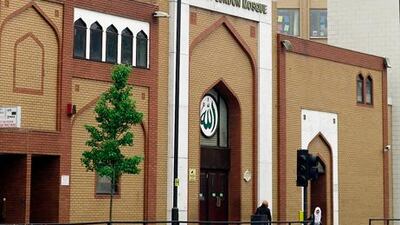LONDON // The East London Mosque is either full of extremists bent on imposing Sharia or they are western-style liberals intent on selling out Islam, depending what you read in the press or on the internet.
Shaynul Khan, the assistant executive director of the mosque and the adjacent London Muslim Centre, said he shrugged off the various controversies that have raged around him.
He said he is simply trying to get on with running what is Britain's, possibly Europe's, biggest mosque and community centre, drawing 5,000 people to Friday prayers during Ramadan.
"We get stuck in the middle, battling both ends of the political spectrum," said Mr Khan, 37, who was born in Bangladesh but moved with his family when he was 2 to Tower Hamlets in East London. "The fact is that we do not condone any extremists nor do we advocate any political programme."
The mosque, in one of the poorest parts of London, is celebrating its centenary amid plans for expansion but it has vocal critics.
The English Defence League (EDL), the anti-immigration far-right group and inspiration for Norway's mass killer Anders Behring Breivik, plans to march through Tower Hamlets in September. When the group planned their provocative march through the area in June 2010, up to 4,000 Muslims congregated to defend the East London Mosque, said Mr Shaynul.
"Once we knew the EDL wasn't coming, we were worried we would have all these young people without any target to vent their anger on," he said. "We persuaded the police to keep back until we had managed to disperse them all without any serious incident."
He told the story to illustrate the mosque's good relations with the police and other groups in the neighbourhood. After the terrorist attacks in London in 2005, the mosque found itself on the front line. "We were a first-aid responder to the injured and members donated blood, but you won't hear about that on the news," said Mr Khan.
Right-wing newspapers and commentators contend the mosque has links to the Islamic Forum Europe, a grassroots welfare group; the Jamaat i-Islami, an Islamic political party in Bangladesh; and Hizb ut-Tahrir, a group seeking a return of the caliphate. All the groups have been accused of supporting Islamic extremism. Mr Khan explained the ties one-by-one. The Islamic Forum Europe rented offices in the business wing of the London Muslim Centre and provided volunteers for the mosque. Many members of the mosque's congregation who were of Bangladeshi origin supported the Jamaat I-Islami but the mosque did not provide organisational support. The ideology of groups such as Hizb ut-Tahrir was not welcome either, he said.
The mosque and centre was now much more diligent when renting out its halls to guest speakers, he said. "People who work with us know all about our interfaith work, how we welcome Christians, Jews and people of other faiths to see us here, and how we do not tolerate extremism of any form, either from the far right or from within our own," he said. "We're not afraid of painful discussions."
The first meeting to raise money to establish a mosque and Islamic centre in London was held in 1910 and Friday prayers were initially held in rented halls. The mosque officially opened in 1941 and moved to its present premises in 1985. The London Muslim Centre opened in 2004, when more than 15,000 people prayed with Abdur Rahman Sudais, a renowned Saudi Arabian cleric.
Work is under way on the Maryam Centre, which will include a domestic violence support unit and counselling rooms. It will also have large open windows looking on to the prayer hall next door and all visitors will be welcome to view services.
The mosque was the first in the country to offer Friday prayers with sign language for the deaf. It was also the first to amplify the call to prayer although it keeps the call quiet at night and early in the morning to avoid annoying non-Muslims.
Mr Khan hopes to make the mosque and centre financially self-sufficient through its rental income and business activities within the next eight years. A financial report is published each year, a requirement of any charitable organisation, and donations topped more than £1.1million (Dh6.6m) last year.
Meanwhile, he was prepared to deal with the vagaries of the politicians. He wryly recounted the story of Jim Fitzpatrick, the local Labour member of parliament, who in 2009 walked out of a wedding at the mosque and denounced the practice of separating men and women at Muslim services.
"It wasn't his first time at the mosque and we have CCTV footage of him and his wife talking to someone at the wedding and then calmly leaving," said Mr Khan. "But it was just before the election and maybe what he did and said looked good for certain constituents."

